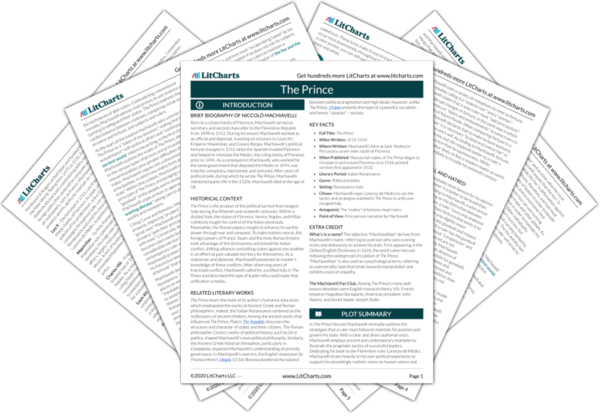Laws and Arms
Machiavelli asserts that the "main foundations" of every state are "good laws and good arms," meaning that a ruler must anchor his state to sound legal and military codes if he wishes to maintain his power. Without this two-fold foundation, Machiavelli argues that the state and its prince are "bound to come to grief." Yet while Machiavelli states that both laws and military might are necessary for the survival of the prince and his state…
read analysis of Laws and ArmsFortune and Prowess
According to Machiavelli, the twin forces of fortune and prowess conspire to determine the outcome of history and, therefore, the success or failure of all princes and states. With the term "fortune," Machiavelli refers to the unpredictability of fate, meaning the ways in which chance, opportunity, and pure luck often influence the course of life. In opposition to fortune, Machiavelli places the idea of "prowess," referencing the skills and abilities that men possess and…
read analysis of Fortune and ProwessGoodwill and Hatred
Machiavelli is probably most famous for his opinion concerning "whether it is better to be loved than feared." But according to Machiavelli, a wise prince may be better served by focusing on the distinction between goodwill and hatred. Above all else, a ruler "must only endeavor . . . to escape being hated," for the "best fortress that exists is to avoid being hated by the people." Of only slightly lesser importance, the prince must…
read analysis of Goodwill and Hatred
Virtue vs. Vice
In The Prince Machiavelli blurs the line between virtue and vice, arguing that, for princes, the value of an action rests solely on the context and end result of its performance. Virtue and vice are not fixed terms, and Machiavelli states that a prince "will find that some of the things that appear to be virtues will, if he practices them, ruin him, and some of the things that appear to be vices will bring…
read analysis of Virtue vs. ViceThe Masses and The Elite
Machiavelli regularly juxtaposes the masses, or "common people," against the ruling elite in The Prince. To justify his decision to write the book, Machiavelli invokes this class-based contrast, stating, "To comprehend fully the nature of princes one must be an ordinary citizen." As with other opposing pairs described in The Prince, Machiavelli argues that the two entities, while vastly different, rely on each other for mutual survival and understanding. The "friendship" of the…
read analysis of The Masses and The Elite






